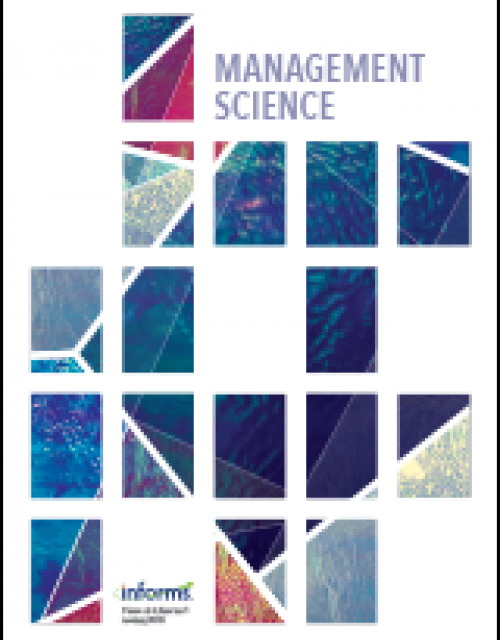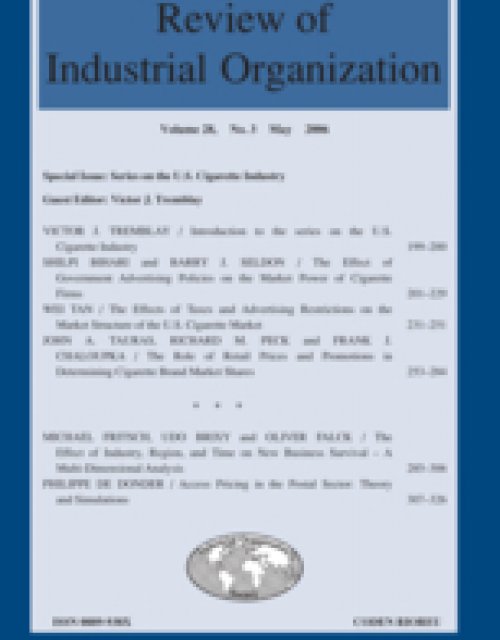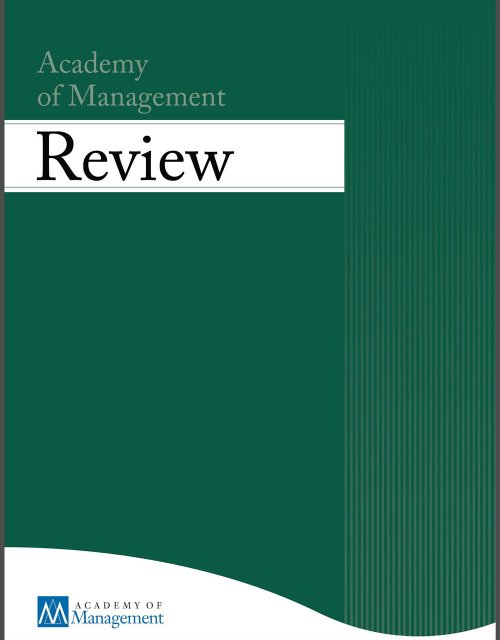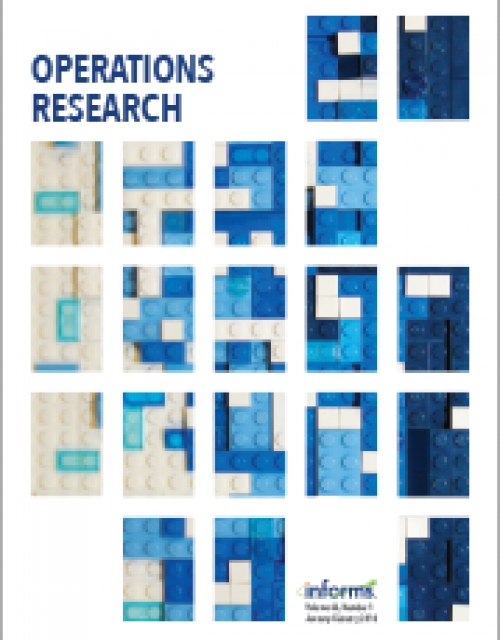Publication records
Subject(s)
Human resources management/organizational behavior; Strategy and general management; Technology, R&D management
Keyword(s)
innovation, HR, inventor mobility, alliance formation
While losing a valuable employee to competition shouldn't be celebrated, it does provide an opportunity for innovation and collaboration
© copyright Mark Allen Group 2019
Subject(s)
Management sciences, decision sciences and quantitative methods
Keyword(s)
Capacity investment, optimal contracts, capital diversion, financial constraints, newsvendor model, moral hazard
We study a firm's capacity choice under demand uncertainty given it must finance this investment externally.
Sharing profits with investors causes governance problems affecting both capacity and demand: the firm may “steal" capital, which reduces effective capacity, and \shirk" on market-development, which reduces demand. We adopt an optimal contracting approach whereby the firm optimizes among feasible financial claims derived endogenously. We characterize its optimal financing and capacity choices. First, debt financing is optimal: it minimizes the incentives to both divert and shirk. Second, the firm underinvests (overinvests) if the effort problem is mild (severe) enough relative to the diversion problem. Thus, a worsening of the same governance problem can lead to over- or underinvestment depending on circumstances. Third, we find that the diversion and shirking problems interact in their impact on capacity investment. In particular, if the shirking problem is mild enough, the more severe the diversion problem, the less the firm invests. However, if the shirking problem is severe enough, the effect of diversion is reversed: the more severe the diversion problem, the more the firm invests.
Sharing profits with investors causes governance problems affecting both capacity and demand: the firm may “steal" capital, which reduces effective capacity, and \shirk" on market-development, which reduces demand. We adopt an optimal contracting approach whereby the firm optimizes among feasible financial claims derived endogenously. We characterize its optimal financing and capacity choices. First, debt financing is optimal: it minimizes the incentives to both divert and shirk. Second, the firm underinvests (overinvests) if the effort problem is mild (severe) enough relative to the diversion problem. Thus, a worsening of the same governance problem can lead to over- or underinvestment depending on circumstances. Third, we find that the diversion and shirking problems interact in their impact on capacity investment. In particular, if the shirking problem is mild enough, the more severe the diversion problem, the less the firm invests. However, if the shirking problem is severe enough, the effect of diversion is reversed: the more severe the diversion problem, the more the firm invests.
Copyright © 2019, INFORMS
Volume
65
Journal Pages
4951–5448
Subject(s)
Economics, politics and business environment; Information technology and systems; Technology, R&D management
Keyword(s)
Telecom mergers, static and dynamic efficiency, difference-in-difference
JEL Code(s)
L22, O33, G34, L96
This paper studies five mergers in the European wireless telecommunication industry and analyzes their impact on prices and capital expenditures of both merging carriers and their rivals. We find substantial heterogeneity in the relationship between increases in concentration and carriers’ prices. The specifics of each merger case clearly matter. Moreover, we find a positive correlation between the price and the investment effects; when the prices after merger increase (decrease), the investments increase (decrease) too. Thus, we document a trade-off between static and dynamic efficiencies of mergers.
Copyright © 2019, The Author(s)
Volume
55
Journal Pages
375–402
Keyword(s)
Digital strategy, government, digital law, digital infrastrucure
Today’s digital strategy of governments worldwide is failing. The result is a weakening of government functions in the digital sphere – with risks for democracy and freedom. Digital innovation on a society-wide scale will only be effective if governments adopt stronger digital strategies. Key issues are a principle-oriented, less-specific digital regulation, bigger government’s spendings for digital infrastructures, a greater autonomy of state and local governments, and the establishment of a ‚Ministry for Digital Affairs“.
Subject(s)
Strategy and general management
Keyword(s)
Luck, biases, regression to the mean, strategic factor market, strategic opportunities, behavioral barriers
How performance is perceived and attributed has important implications for strategizing. Much research in the cognitive and social sciences suggests that people tend to mistake luck for skill in evaluations and ignore how future performances regress to the mean. We argue that these systematic mistakes can be translated into an alternative source of profit: informed strategists can take advantage of others’ misattributions of luck by exploiting the false expectations and mispricing in strategic factor markets. We also discuss the learning and interdependency barriers that protect, and thus predict the attractiveness of, a behavioral opportunity and suggest approaches to help overcome these behavioral barriers.
With permission of the Academy of Management
Volume
44
Journal Pages
896–915
ISSN (Online)
1930-3807
ISSN (Print)
0363-7425
Subject(s)
Information technology and systems; Technology, R&D management
Keyword(s)
Digital strategy, government reform, digital law, digital infrastrucure
Digital innovation can be extremely beneficial to citizens. However, current digital strategies of governments are not strong enough to ensure that digital innovation is not a threat to society – but, only a benefit. Digital innovation will only be effective if governments adopt strong digital strategies. Key issues are a less-specific digital regulation, a greater government’s investment in digital infrastructures, a higher flexibility for local governments, and a strengthening of digital policy leadership within governments.
Keyword(s)
Inter-organizational collaboration, crowdsourcing, innovation, interdependence, search, organization
Volume
64
Journal Pages
239–270
ISSN (Online)
978-1-78756-591-3
ISSN (Print)
978-1-78756-592-0
Subject(s)
Management sciences, decision sciences and quantitative methods; Product and operations management
Keyword(s)
Dynamic mechanism design, social efficiency, multi-agent games, resource allocation without money
We consider a principal repeatedly allocating a single resource in each period to one of multiple agents, whose values are private, without relying on monetary payments over an infinite horizon with discounting. We design a dynamic mechanism without monetary transfers, which induces agents to report their values truthfully in each period via promises/threats of future favorable/unfavorable allocations. We show that our mechanism asymptotically achieves the first-best efficient allocation (the welfare-maximizing allocation as if values are public) as agents become more patient and provide sharp characterizations of convergence rates to first best as a function of the discount factor. In particular, in the case of two agents we prove that the convergence rate of our mechanism is optimal, i.e., no other mechanism can converge faster to first best.
Copyright © 2019, INFORMS
Volume
67
Journal Pages
ii–iv, 1209–1502
Keyword(s)
international human rights, right to vote, voter fraud, disinformation, authoritarianism
Subject(s)
Marketing
Keyword(s)
Luxury, advertising, branding, culture, storytelling, communication, marketing
Advertising is central to creating brand meaning by endowing brands with symbolic values and embedding them within their broader sociocultural context. This study analyzes how the symbolic meaning of luxury brands is constructed in print advertisements. In particular, the study shows how brand communications of luxury brands systematically differ from those of premium and mass-market brands. Through a comparative analysis of thematic and formal characteristics of 208 print advertising campaigns consisting of about 1,700 individual ads from the primary advertising campaigns of four luxury brands, four premium brands, and four mass-market brands, this study identifies three distinguishing factors of luxury brand communication: enrichment, distancing, and abstraction. First, luxury brand advertising enriches the communication content by using more complex campaign templates that make more frequent use of symbolism, rhetorical structures, and storytelling. Second, luxury brand advertising systematically uses distancing techniques, such as temporal, spatial, social, and hypothetical distancing. Third, luxury brand ads use higher-level discourses that allow for different interpretations of brand advertisements. Therefore, this study provides insights into the construction of brand identity in the luxury field, as well as the broader sociocultural construction of luxury and the evolution of its core symbolic constituencies.
Volume
48
Journal Pages
401–414
ISSN (Online)
1557-7805
ISSN (Print)
0091-3367



